Creating content is easy. Creating content that actually performs? That’s a different story.
If you’re publishing regularly but not seeing results, chances are you’re missing one key element: the right tools.
Today, using the best content marketing tools isn’t optional; it’s how smart marketers plan, create, distribute, and track content at scale.
According to a 2024 report by Semrush, 68% of businesses have reported an increase in content marketing ROI after integrating AI tools into their workflows.
With that ratio, agencies and businesses must have to add the best content marketing tools to their toolkit.
This blog covers 25 of the top content marketing tools, including AI tools and analytics tools to help you streamline every part of the process.
Let’s dive into the must-haves for content teams that want results.
CTA
Running Low on Caption Ideas?
Social Champ’s AI-powered caption generator helps you craft engaging copy in seconds, without writer’s block.
Short Summary
- Utilizing the best content marketing tools is crucial for effective planning, creation, distribution, and analysis of content.
- Content strategy and research tools, such as Ahrefs and Semrush, provide in-depth insights for keyword research and competitor analysis.
- AI-powered writing tools such as Jasper and Grammarly accelerate content creation while maintaining quality through editing assistance.
- Visual design tools like Canva and Pictory help transform content into engaging visuals and videos to boost audience interaction.
- Scheduling and distribution platforms like Social Champ and Buffer streamline posting and audience engagement across multiple channels.
Content Strategy and Research Tools
A solid content strategy starts with the right insights.
Whether it’s finding the best keywords, analyzing competitors, or uncovering trending topics, using reliable content marketing tools for research can save time and shape smarter decisions.
The tools below have different strengths; some focus on in-depth SEO data, while others excel in content ideation or competitive intelligence, providing options tailored to your specific needs.
-
Ahrefs
Ahrefs is a powerhouse for keyword research and competitor analysis.
Its vast index provides reliable data on search volume, keyword difficulty, and backlink profiles.
You can rely on its Site Explorer feature to dissect competitor strategies, seeing which pages drive traffic and where backlinks come from is invaluable for shaping my outreach.
Ahrefs also offers detailed rank tracking and content gap analysis, which helps identify missed keyword opportunities.
While the interface is comprehensive, it can feel complex at first. Still, for deep SEO research, Ahrefs is one of the most accurate and trusted tools in my experience.
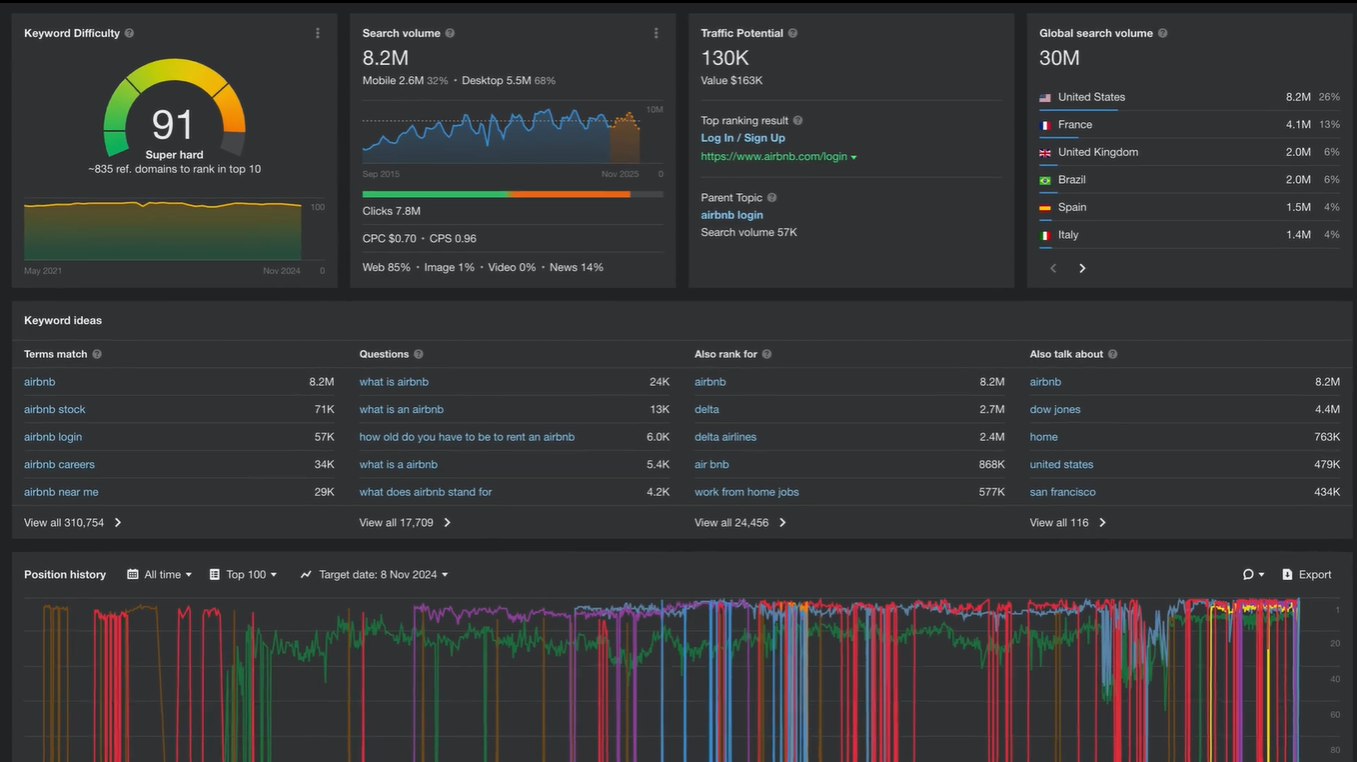
Ahrefs’ Dashboard -
Semrush
Semrush combines SEO, social media, and content marketing insights in a single platform.
We often use its Keyword Magic Tool to discover extensive keyword ideas and analyze their potential.
Beyond keywords, Semrush offers competitive domain analysis, backlink audits, and even PPC data, making it versatile for integrated campaigns.
The content marketing toolkit helps with topic research and SEO content templates, which guide content creation based on competitor benchmarks.
Although its dashboard can be dense, focusing on key features unlocks strong strategic value, especially when managing multi-channel campaigns.

Semrush’s Homepage -
BuzzSumo
BuzzSumo specializes in content research and trend analysis, focusing on what resonates with audiences at the moment.
This tool is ideal for identifying trending topics, determining which articles receive the most shares, and discovering influential content creators.
This helps businesses plan content that’s timely and shareable.
Unlike pure SEO tools, BuzzSumo excels in assessing content performance and social engagement, rather than focusing on keyword metrics.
For ideation and influencer marketing, it’s an essential tool.
However, it works best paired with traditional SEO platforms for a complete content strategy.

BuzzSumo’s Homepage -
Ubersuggest
Ubersuggest offers straightforward keyword research and basic competitive insights, great for beginners or those with limited budgets.
We appreciate its clear interface and quick access to search volume, SEO difficulty, and backlink data.
It’s not as feature-rich or deep as Ahrefs or Semrush, but it provides solid starting points for keyword targeting and content ideas.
Its content ideas section highlights popular posts around your keywords, which can inspire blog topics.
While it doesn’t support advanced analysis, Ubersuggest remains a handy, cost-effective tool for small businesses and solo bloggers.
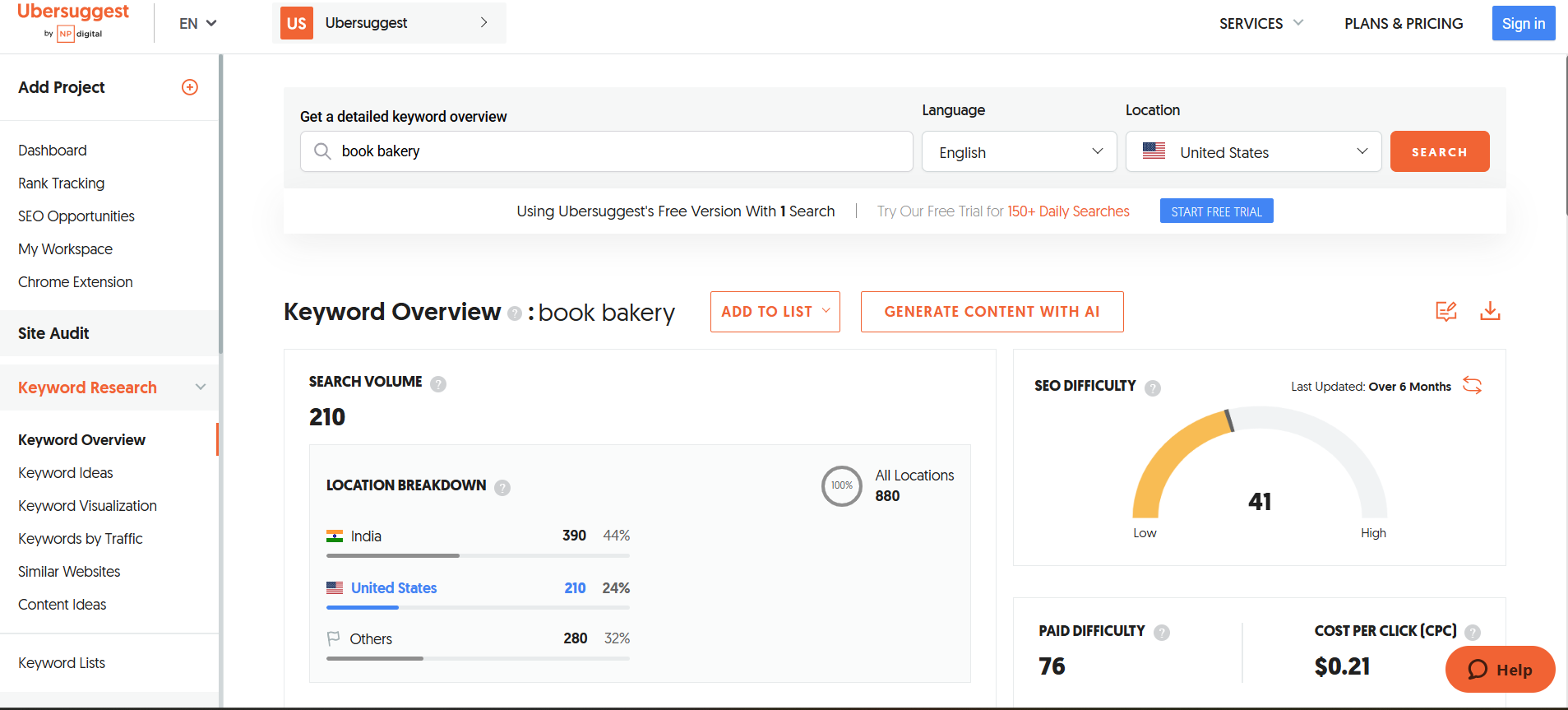
Ubersuggest’s Dashboard -
AnswerThePublic
AnswerThePublic excels at content ideation by visualizing search queries people type around your keywords.
When planning topics, it can be used to uncover the specific questions and concerns real users have, which helps tailor content to actual needs.
Its graphic displays group queries into categories, such as questions, comparisons, and prepositions, making it easier to identify opportunities for blog posts or FAQs.
Although AnswerThePublic doesn’t offer SEO metrics like keyword difficulty, it complements other research tools by focusing on user intent and content gaps, which are vital for engaging and useful content.
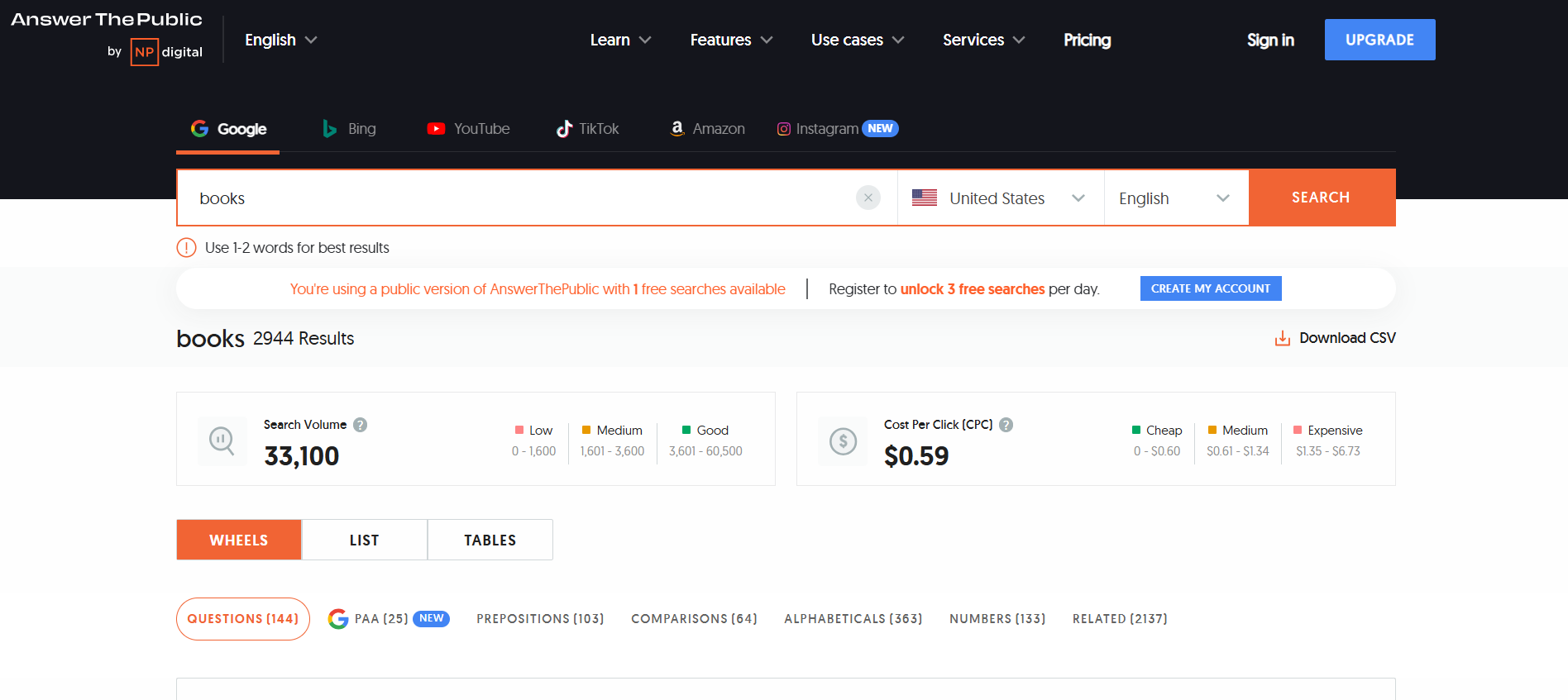
AnswerThePublic’s Homepage -
SpyFu
SpyFu is designed for competitive keyword and PPC research.
It helps to analyze which keywords competitors rank for organically and which ones they invest in via paid ads.
Spyflu’s competitor keyword overlap reports help identify missed opportunities and inform bidding strategies.
It also tracks historical performance, showing how competitors’ tactics evolve over time.
While it doesn’t cover content ideation or site audits, its strength lies in revealing competitor strategies that can influence your own SEO and paid campaigns, especially when budget allocation and targeting are most critical.
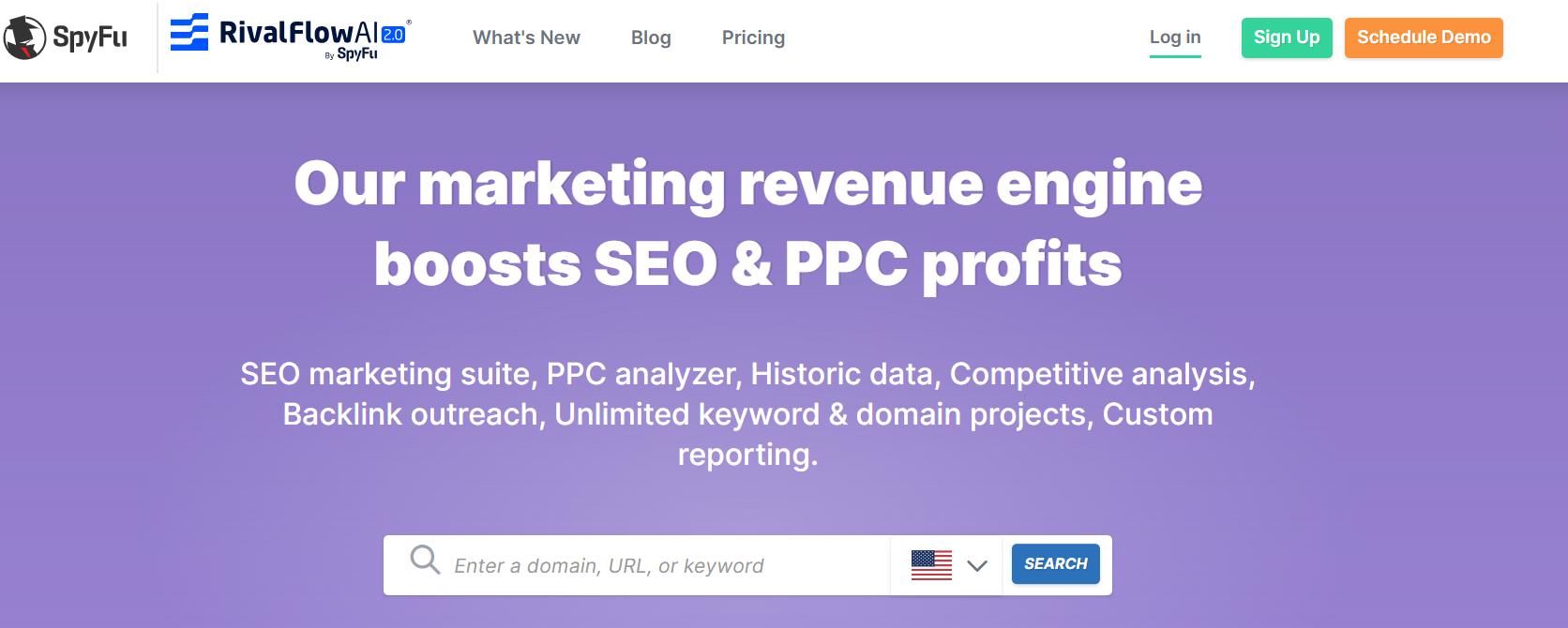
Spyfu’s Homepage Featured Article: The Best Time to Post on Instagram in 2025: Maximize Engagement With Data-Driven Insights
Content Creation and AI Writing Tools
Creating high-quality content consistently can be overwhelming, especially when deadlines pile up.
That’s where content marketing tools with AI capabilities come into play, helping you draft, edit, and even create multimedia content faster.
These tools aren’t just about automation; they help sharpen your message and boost productivity, allowing you to focus on strategy and creativity while they handle the heavy lifting.
-
Jasper
Jasper is a powerful AI writing assistant that helps generate content quickly based on prompts you provide.
We’ve often used it to draft blog introductions and social media captions, appreciating its flexibility in adapting tone and style to different brands.
While Jasper accelerates the writing process, we treat it as a first draft generator; human review remains essential to ensure accuracy, consistency, and authenticity.
It’s great for overcoming writer’s block, but not a full substitute for skilled writing or editing.
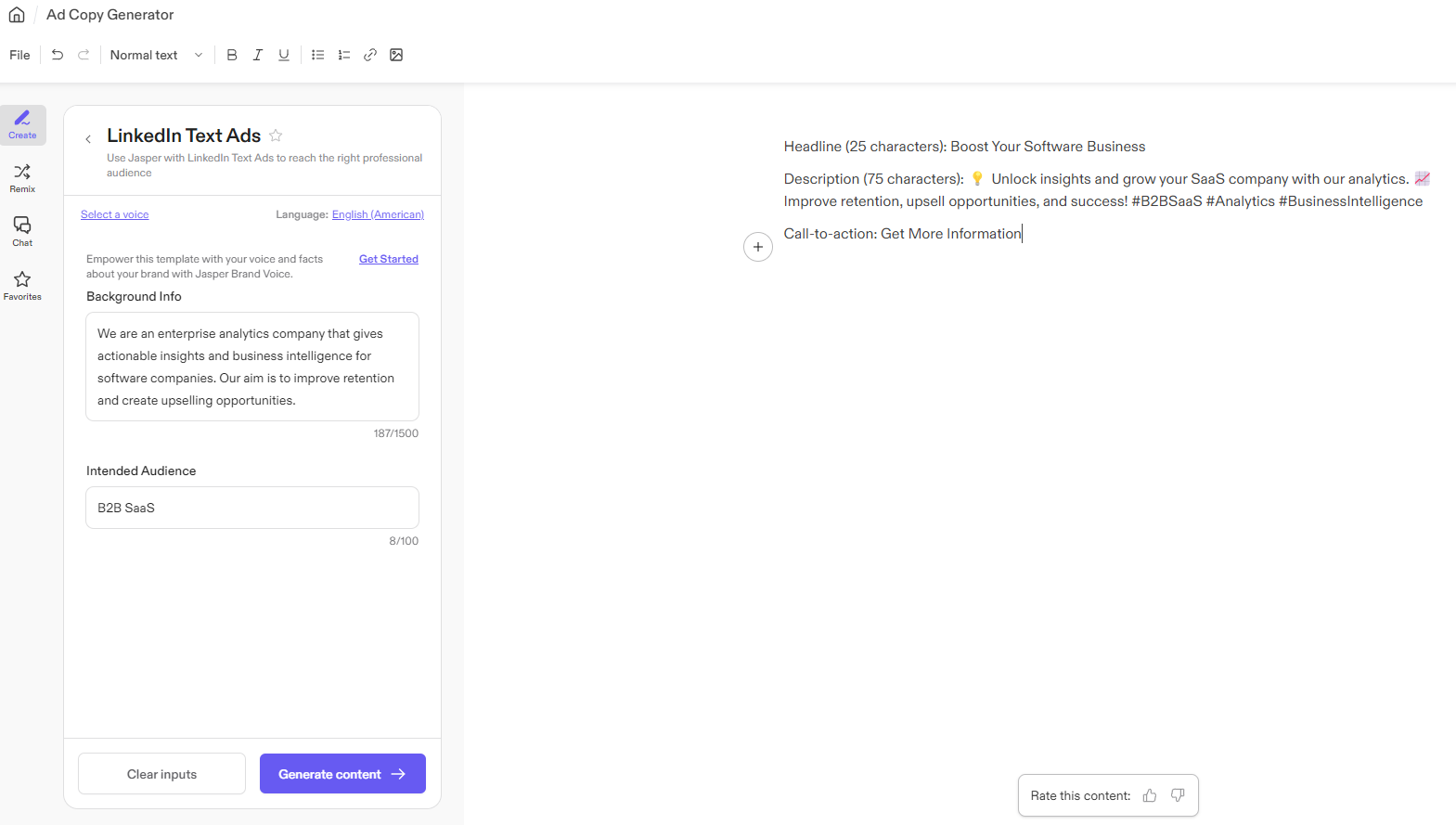
Jasper AI’s Dashboard -
Grammarly
Grammarly goes beyond basic spelling and grammar checks by improving tone, clarity, and engagement in real-time.
You can rely on it heavily to polish drafts before publishing, especially for catching subtle grammar mistakes and awkward phrasing that can slip through manual edits.
Its readability suggestions help make content more accessible, which is vital when addressing diverse audiences.
Grammarly doesn’t generate content, but complements AI tools well by elevating the final quality and maintaining professional standards.

Grammarly’s Dashboard -
Copy.ai
Copy.ai specializes in marketing copy generation, from blog ideas to product descriptions.
It is particularly useful when brainstorming or facing writer’s block, as it quickly offers multiple versions of text that spark creativity.
However, the outputs need close editing because AI-generated content can sometimes be generic or miss brand nuances.
You can use Copy.ai more as a creative collaborator to jumpstart writing rather than as a complete solution.
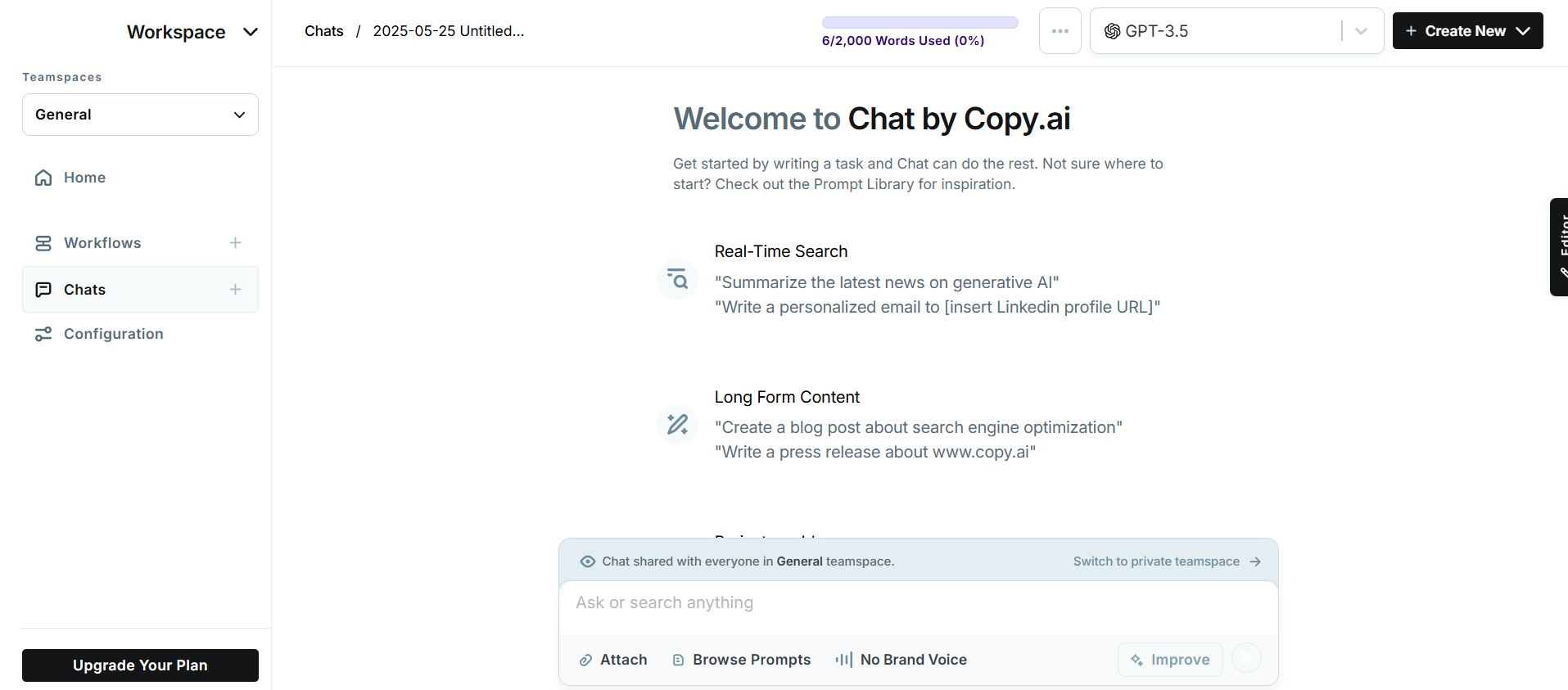
Copy.ai’s Dashboard -
Pictory
Pictory is designed to convert text content into engaging videos, a must-have as video continues to grow in importance for content marketing.
You can use Pictory to transform blog posts into short, shareable videos without requiring video editing expertise.
Its AI automatically extracts key points and adds captions, making the video creation process efficient.
This tool helps extend content reach across platforms where video performs best, and its simplicity allows marketers without specialized skills to produce professional results quickly.
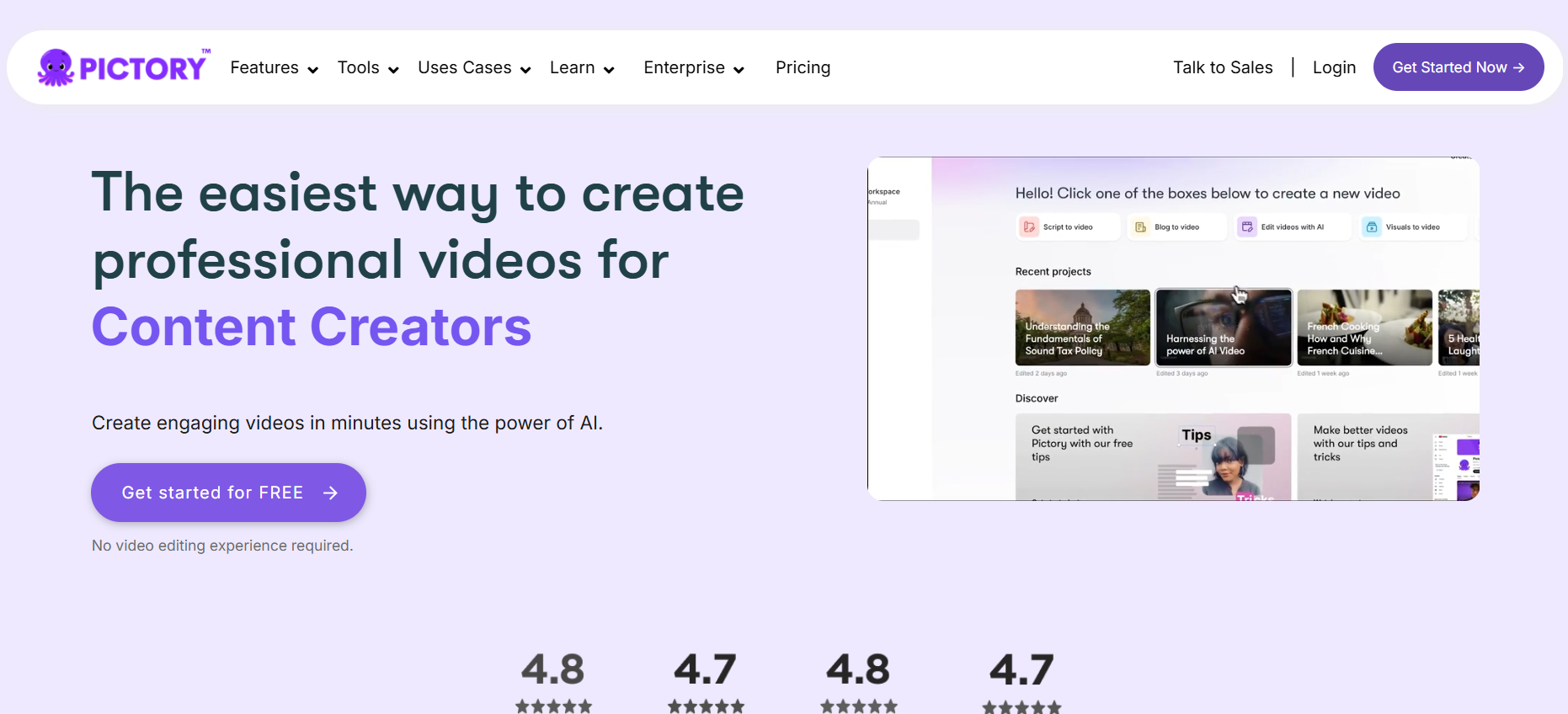
Pictory’s Homepage -
Writesonic
Writesonic is a versatile AI-powered writing tool that supports a wide range of content, from long-form blog posts to social media captions and ads.
You may use its blog post generator to save time drafting initial content, appreciating the SEO-focused templates that help optimize articles from the start.
Like all AI writers, it needs human oversight to maintain voice consistency and avoid generic phrasing.
Writesonic works well as a productivity booster, but should be paired with thoughtful editing for best results.
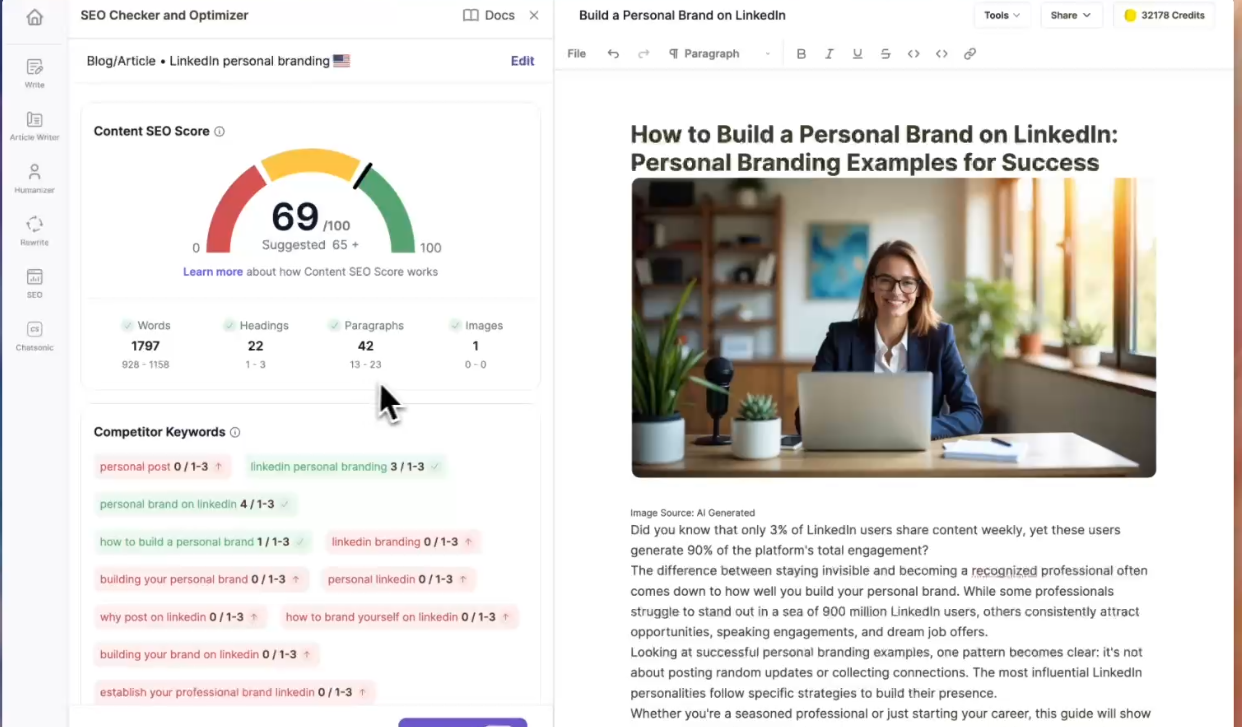
Writesonic’s Dashboard -
Descript
Descript combines transcription, audio/video editing, and screen recording in a single platform, making it unique among content tools.
It is primarily used for podcast editing and creating video content more efficiently.
Descript’s text-based editing allows cutting or rearranging content simply by editing the transcript, which drastically simplifies multimedia editing workflows.
This tool is ideal for content creators who want to streamline audio and video production without mastering complex editing software.
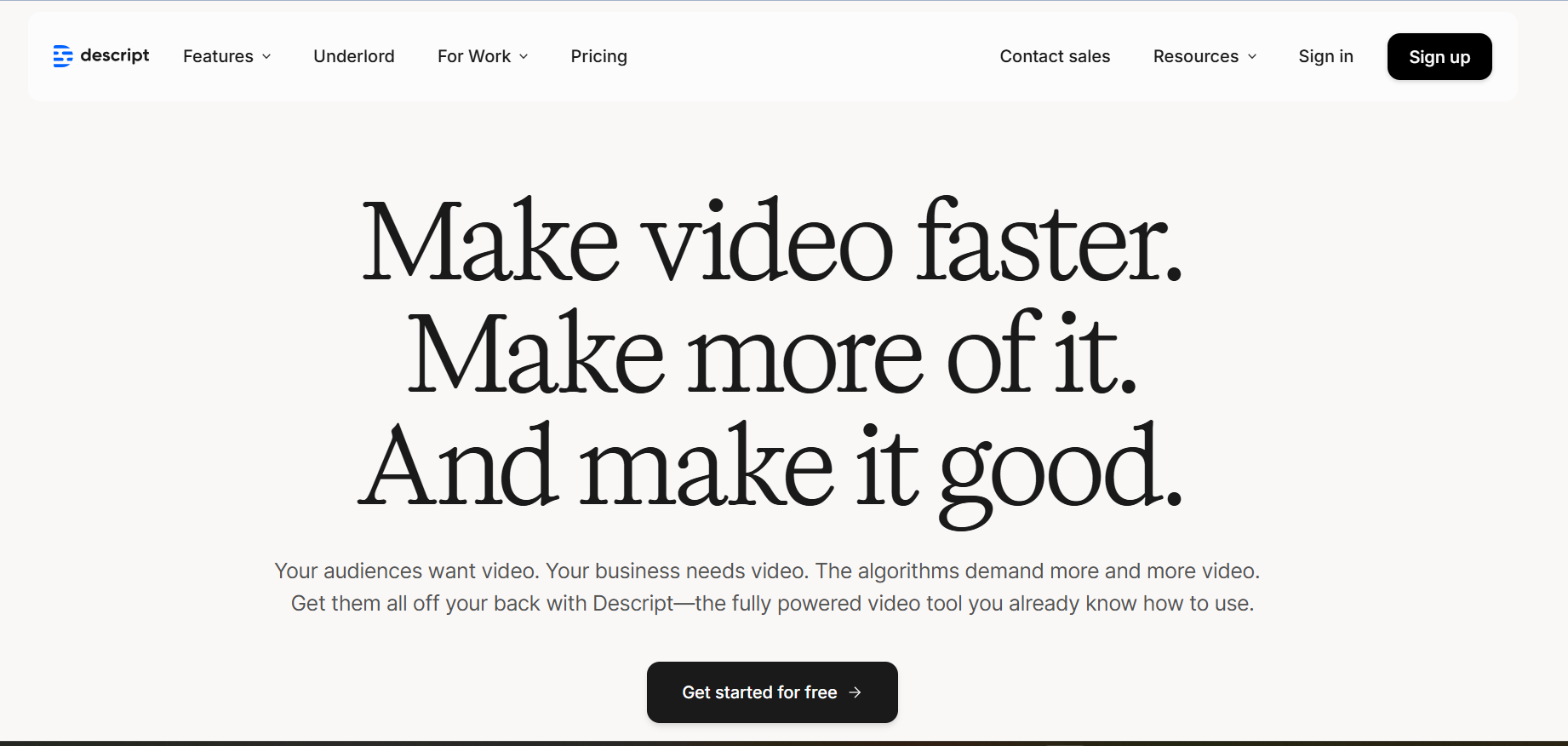
Descript’s Homepage Visual Design and Media Tools
Visuals are crucial in content marketing, as they help capture attention and convey complex ideas quickly.
Whether you need infographics, social media images, or videos, utilizing the right content marketing tools for design can enhance engagement and maintain brand consistency.
These platforms vary in terms of ease of use, customization options, and media formats, so choosing the one that best fits your workflow and skill level is key.
-
Canva
Canva is probably everyone’s go-to for quick, professional-looking graphics without needing advanced design skills.
Its drag-and-drop interface and vast library of templates make it easy to create social posts, presentations, and infographics.
While not as powerful as Adobe’s suite, Canva’s simplicity and collaboration features make it ideal for teams needing efficient, on-brand visuals.

Canva’s Dashboard -
Visme
Visme is built for creating detailed infographics and presentations with a strong focus on data visualization.
We’ve used it when needing to communicate complex data clearly through charts and graphs.
It offers more customization than Canva for data-heavy content but requires a bit more time to master, making it better suited for marketers who prioritize visual storytelling.
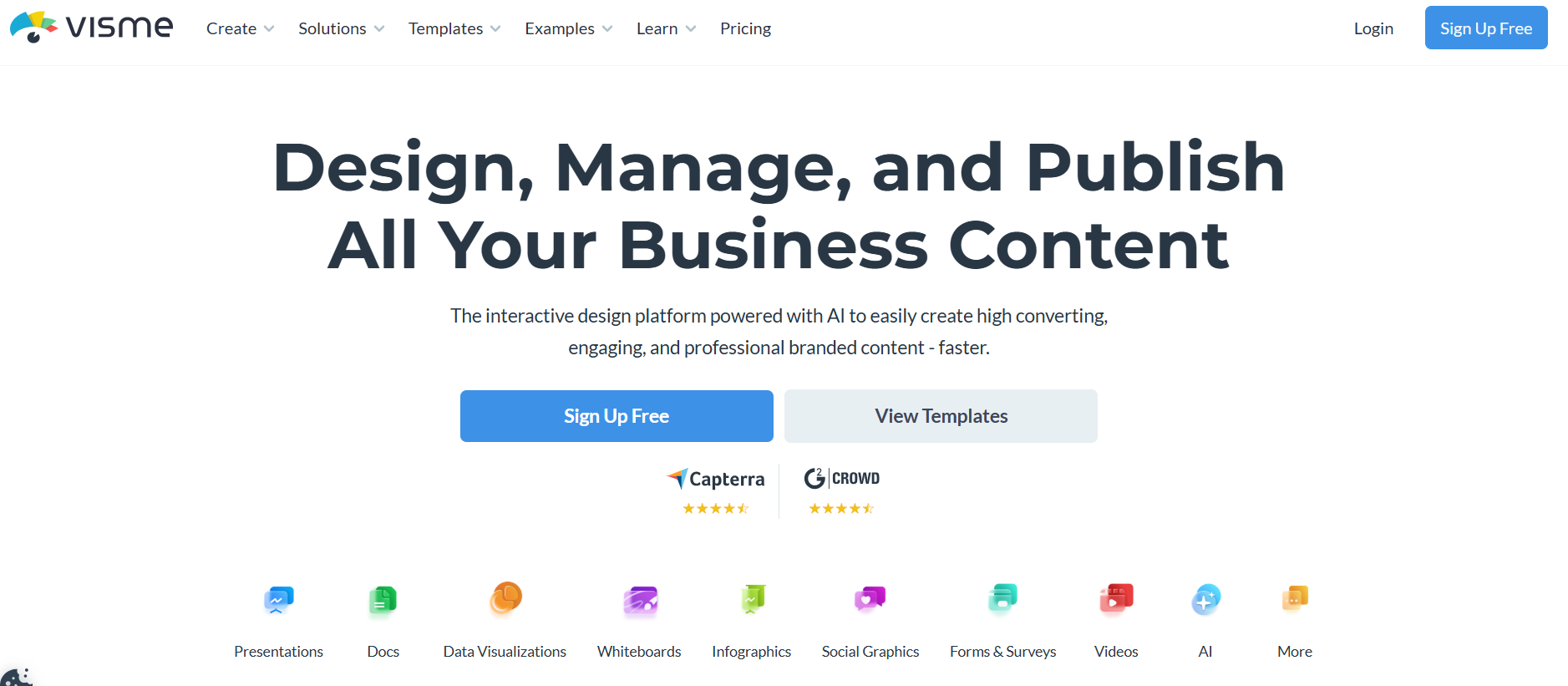
Visme’s Homepage -
Animoto
Animoto simplifies video creation with templates designed for marketing content.
We found it helpful in creating promotional videos or social media clips quickly, especially when you don’t have access to professional video editing software.
Its drag-and-drop builder and stock media library speed up production, though advanced editors might find it limited in flexibility.

Animoto’s Dashboard -
Adobe Express
Adobe Express (formerly Spark) strikes a balance between ease of use and creative control.
It offers polished templates for graphics and videos and integrates well with Adobe’s ecosystem.
We like it for branded social media content, especially when quick turnaround with a professional look is needed, though it may have a steeper learning curve than Canva for beginners.
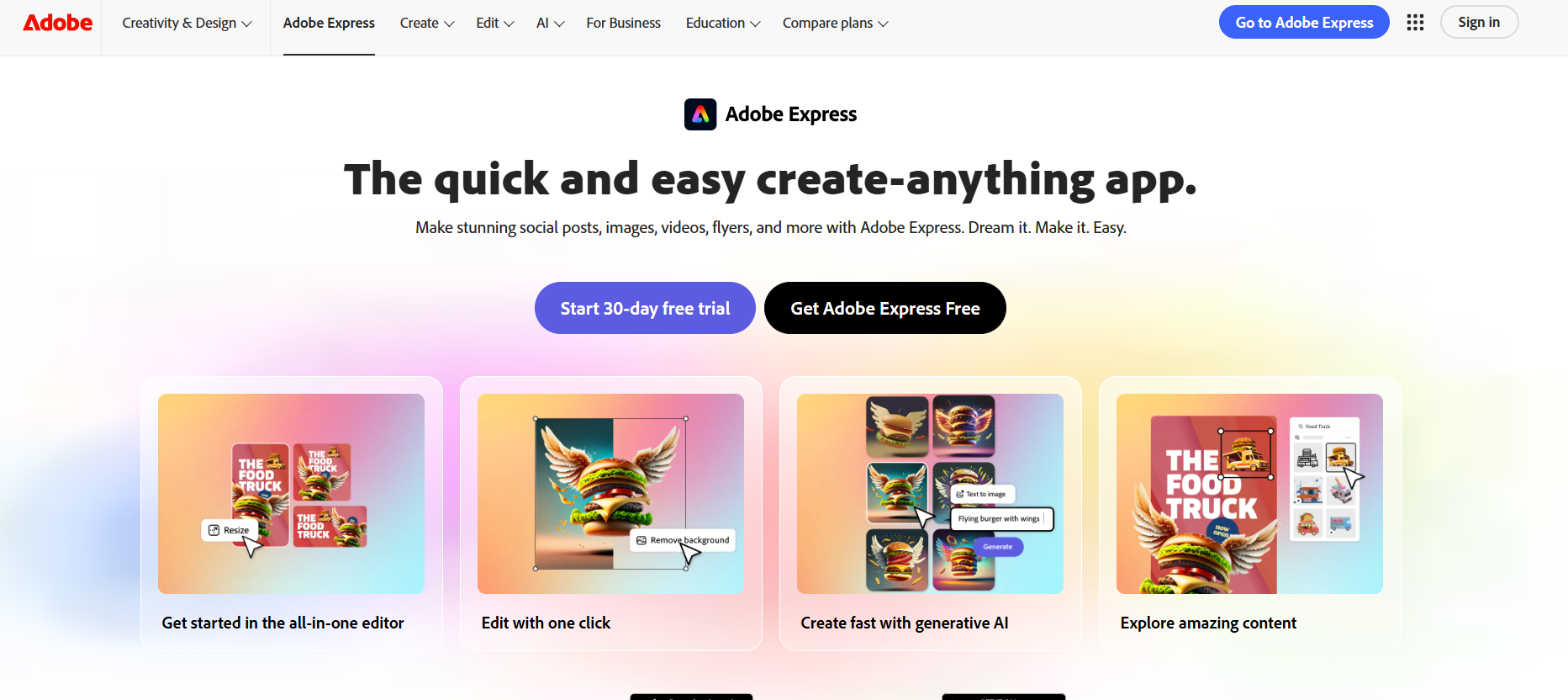
Adobe Express’s Homepage -
Snappa
Snappa is a straightforward design tool focused on social media visuals and ads.
Its simple interface and pre-sized templates reduce guesswork, helping me produce visuals fast.
While it lacks some advanced features of Canva or Adobe Express, Snappa’s speed and usability make it a solid choice for small teams or solo marketers on tight schedules.
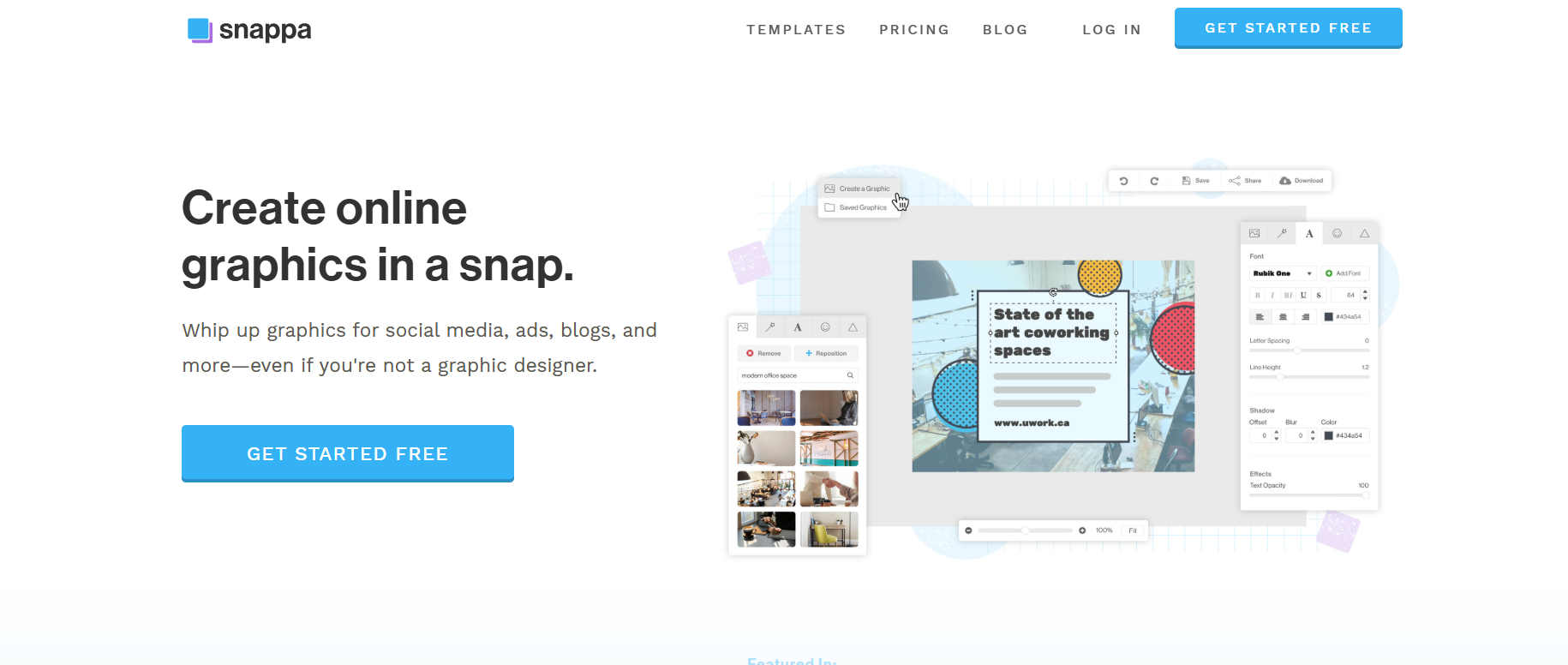
Snappa’s Homepage -
Crello (VistaCreate)
Crello, now VistaCreate, offers a Canva-like experience with strong animation features.
We appreciate its rich library of animated templates and easy editing tools for creating eye-catching social media posts and ads.
While it doesn’t have the brand recognition of Canva, it’s an affordable alternative for marketers who want to add motion graphics without a steep learning curve.
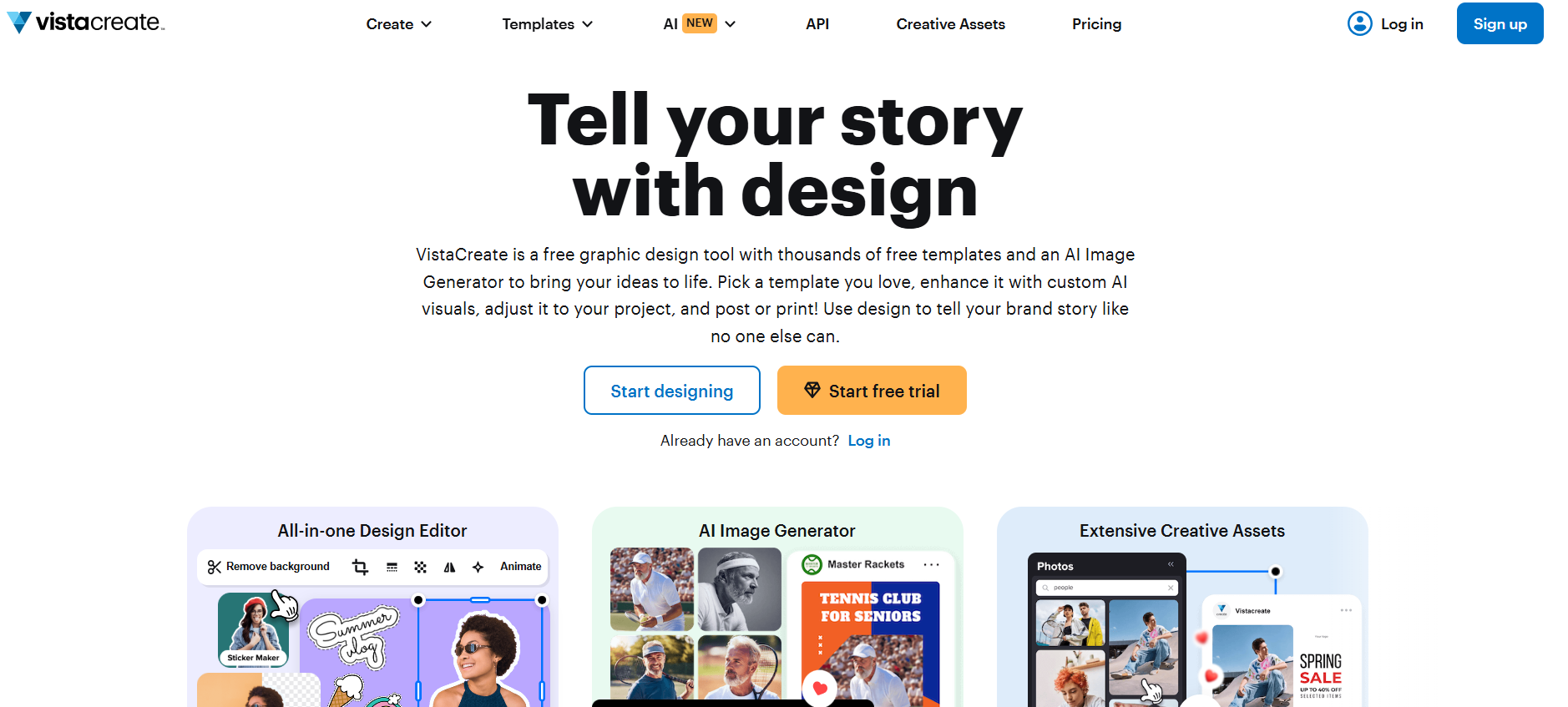
VistaCreate’s Homepage Content Distribution and Scheduling Tools
Creating great content is only half the battle; consistently getting it in front of the right audience drives impact.
Efficient content marketing tools for distribution and scheduling help automate posting, manage multiple channels, and optimize timing.
This frees up time while maintaining engagement.
Each tool offers unique strengths, whether for social media, newsletters, or broader publishing needs, so picking the right fit depends on your content mix and scale.
-
Social Champ
Social Champ stands out with its user-friendly dashboard for scheduling posts across multiple social platforms.
It offers bulk scheduling and robust analytics, making campaign management easier without the need to switch tools.
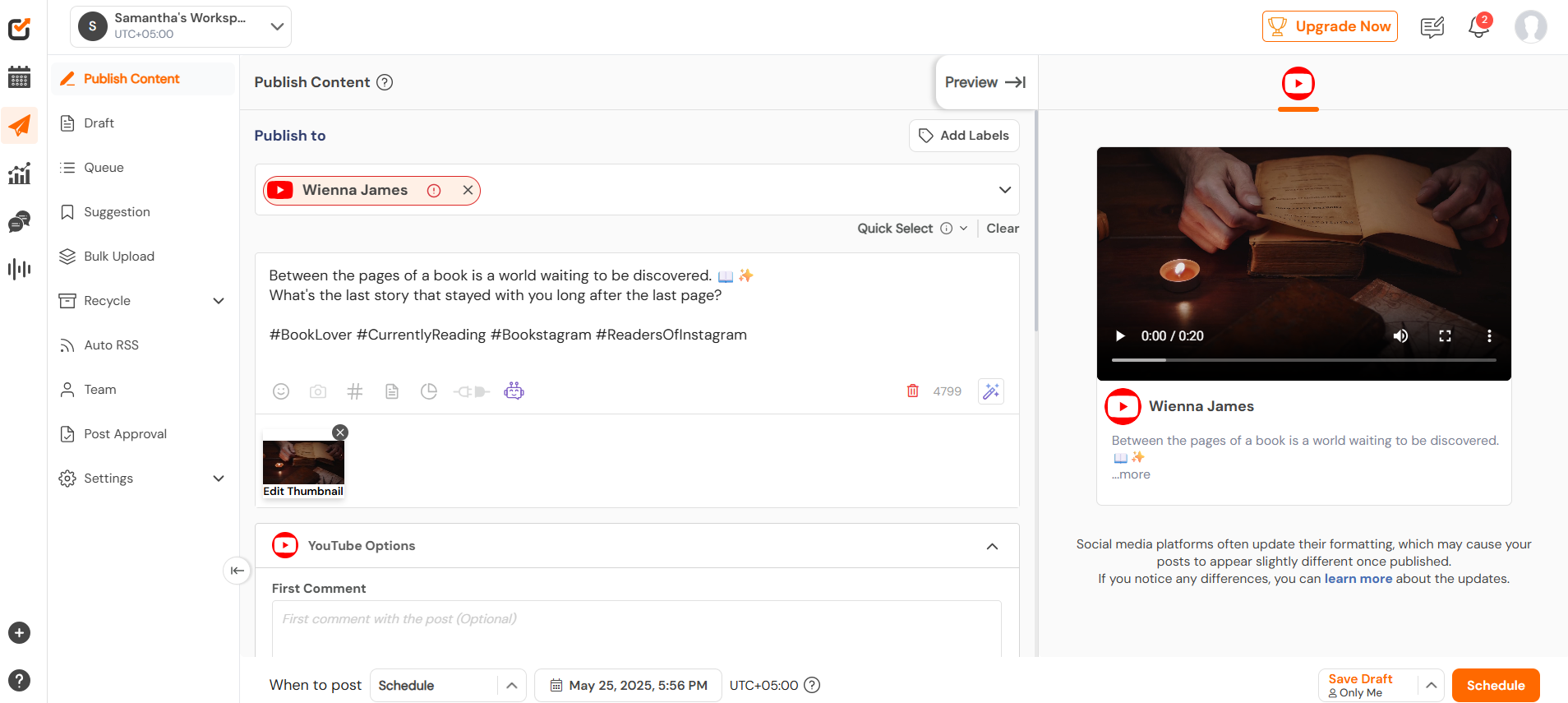
Social Champ’s Dashboard The built-in caption generator and recycling features help keep evergreen content alive.
Some of the top features of Social Champ are:
- Bulk Scheduling: Upload and schedule large volumes of posts at once, saving time when managing extensive content calendars.
- Robust Analytics: Access clear insights on post performance, engagement rates, and audience growth without switching between tools.
- Built-In Caption Generator: Utilize AI-powered suggestions to quickly create engaging social media captions, ideal when you need fresh ideas.
- Content Recycling: Automatically reshare evergreen content at optimal intervals to maintain consistent engagement without extra effort.
- Multi-Platform Management: Manage multiple social accounts from a single dashboard, simplifying campaign coordination.
CTA
Your All-in-One Content Power Tool!
From planning to publishing, Social Champ helps you manage content across platforms effortlessly. Try it now — your future self will thank you.
-
Buffer
Buffer is a reliable, straightforward tool for scheduling and analyzing social media posts.
This tool offers a clean interface and a browser extension that can be useful for quick content curation and sharing.
Buffer’s analytics provide actionable insights without overwhelming data, making it ideal for small to medium businesses looking to streamline social management without complexity.
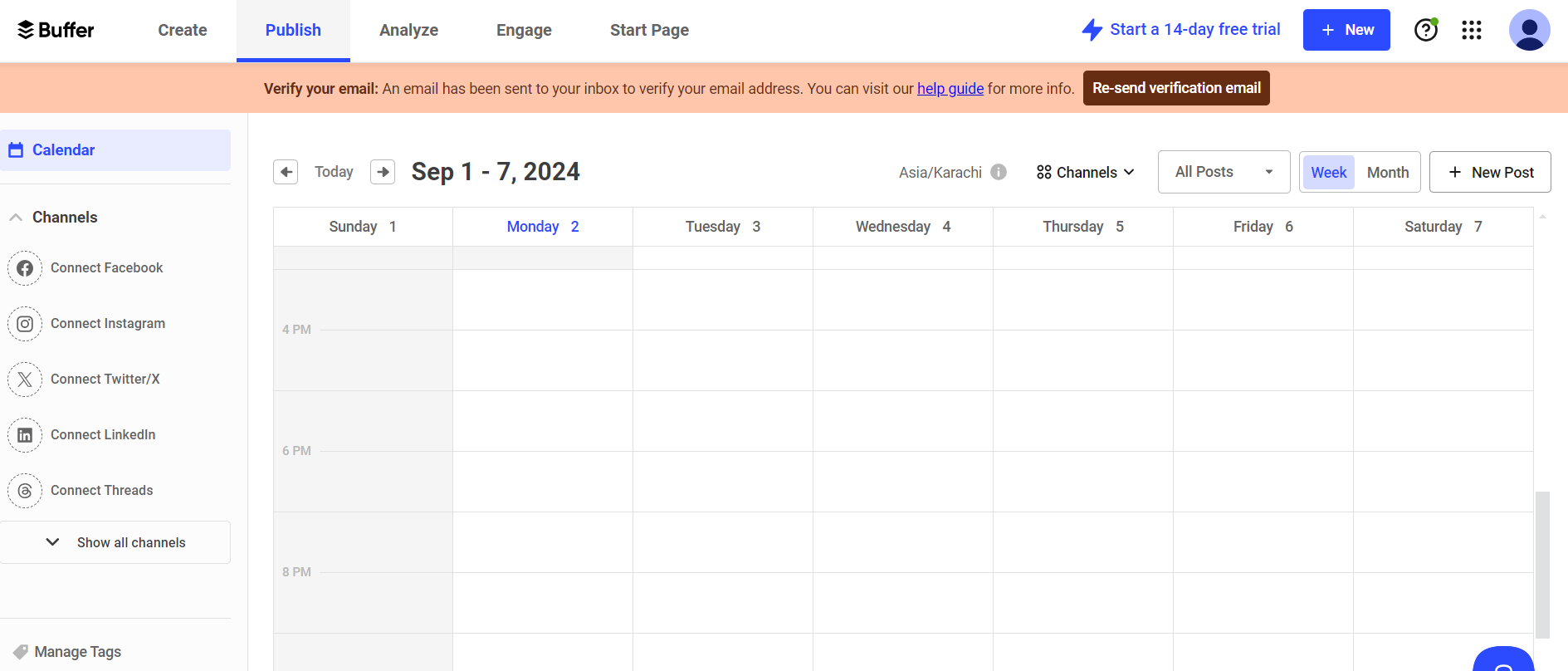
Buffer’s Dashboard -
Mailchimp
Mailchimp is a leader in email marketing with powerful automation and audience segmentation features.
Beyond newsletters, it can be used for targeted campaigns that nurture leads and drive conversions.
Its integration with social channels and detailed reporting allows for coordinated cross-channel marketing, although some advanced features come at a premium price.

Mailchimp’s Dashboard (Source: Mailchimp) -
Hootsuite
Hootsuite offers comprehensive social media management, supporting multiple platforms and team collaboration.
Its scheduling tools are robust, and the ability to monitor brand mentions and engage from one place is a big plus.
You will find it particularly useful for agencies managing multiple clients, though the interface can feel overwhelming for beginners.

Hootsuite’s Homepage -
Later
Later focuses on visual planning and scheduling for Instagram, making it ideal for content marketers prioritizing visual storytelling.
Its drag-and-drop calendar and preview features help maintain a cohesive feed aesthetic.
While its social platform support is narrower, Later excels for brands where Instagram and visual content dominate.
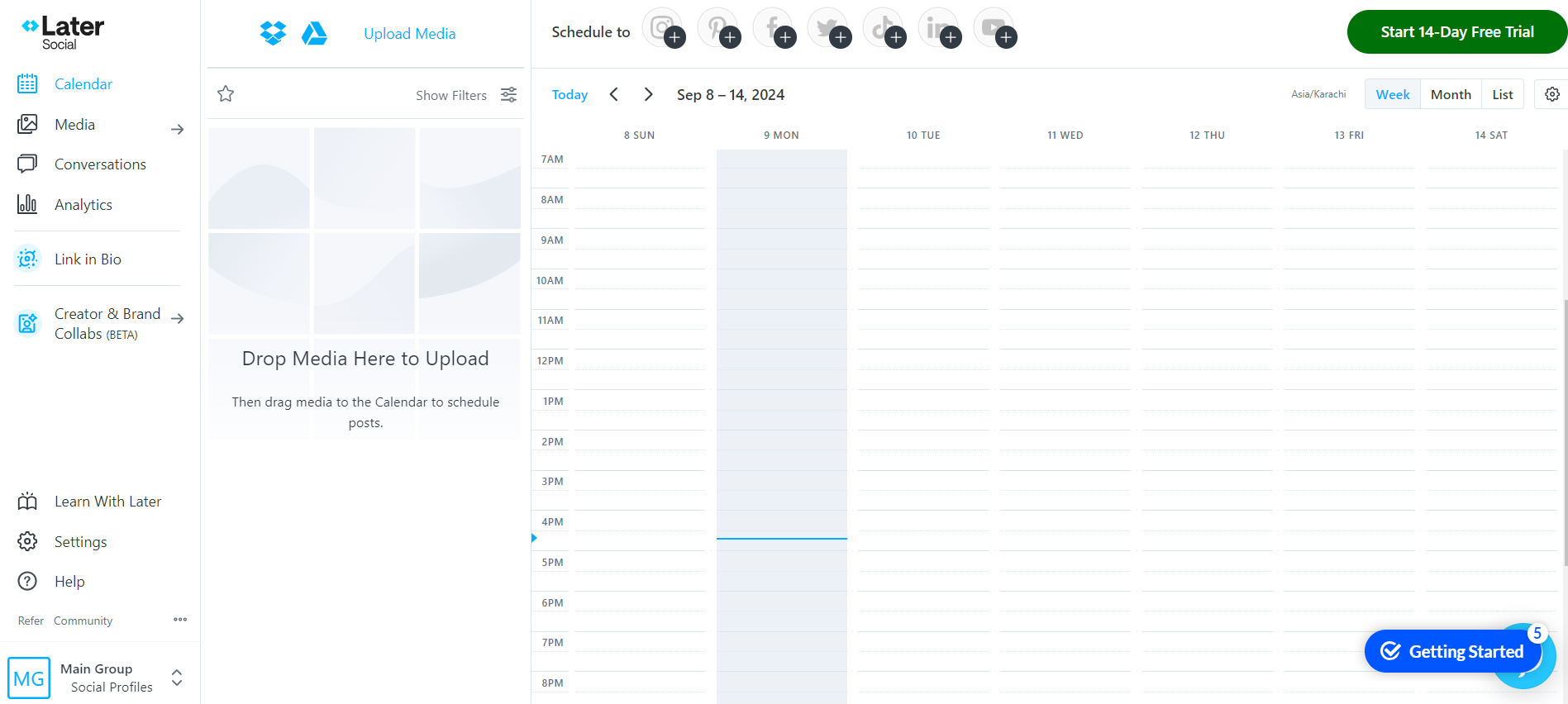
Later’s Dashboard -
CoSchedule
CoSchedule is more than a scheduler; it’s a complete marketing calendar that integrates content planning, social posting, and team workflows.
It offers the ability to align blog publishing with social promotions and track project progress.
While it requires an upfront learning curve and investment, it’s excellent for teams looking for centralized content operations.

CoSchedule’s Dashboard Content Optimization and Analytics Tools
Optimizing your content is crucial to ensure it reaches the right audience and performs well over time.
The best content marketing tools in this category help improve SEO, readability, and user engagement, while offering data-driven insights to refine your strategy.
Balancing technical SEO with user experience is key, and these tools each bring a unique angle to achieving that.
-
Surfer SEO
Surfer SEO excels by combining data from top-ranking pages to provide precise guidelines on optimizing your content structure.
In our experience, it’s invaluable for competitive niches where small SEO improvements can make a big difference.
Surfer’s suggestions on keyword density, ideal word count, and proper heading usage make it easier to align your content with what search engines favor, without guesswork.
It’s a tool that merges technical SEO with content quality, ensuring your posts are both discoverable and valuable to readers.
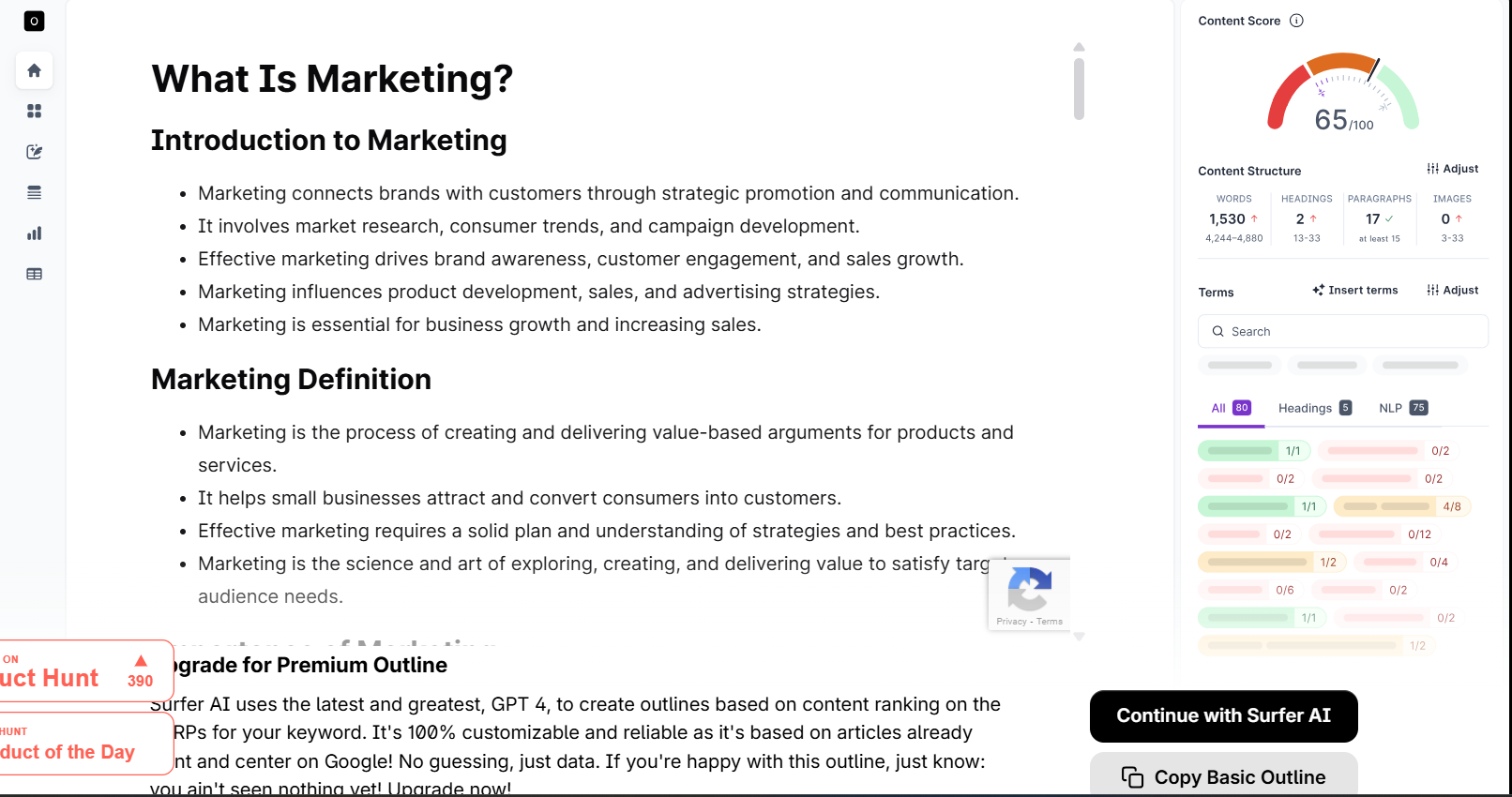
Surfer SEO’s Dashboard -
Clearscope
Clearscope stands out for its focus on content relevance and topic comprehensiveness.
It analyzes a wide range of related keywords and semantic terms your content should cover to address user intent fully.
When we use Clearscope, it helps us expand content depth thoughtfully, avoiding keyword stuffing while hitting all important points readers expect.
Although it doesn’t provide site-wide analytics, its strength lies in making individual pieces more authoritative and complete, which directly improves ranking potential.

Clearscope’s Homepage -
Google Analytics
Google Analytics remains an essential tool for any content marketer aiming to understand how visitors interact with their site.
Beyond tracking page views, it provides insights into user behavior, such as how long visitors stay, which pages cause drop-offs, and conversion funnels.
We use it to evaluate the real-world impact of content, identify bottlenecks, and measure the effectiveness of marketing efforts.
While setup can be technical, its comprehensive, free data makes it irreplaceable for informed decision-making.

Google Analytics’ Dashboard -
Yoast SEO
Yoast SEO is one of the most popular WordPress plugins for on-page optimization, offering real-time feedback on critical SEO factors.
It guides you in improving keyword placement, meta descriptions, and overall readability during the drafting phase.
The plugin’s readability analysis helps maintain a natural flow, essential for keeping readers engaged.
The premium version includes additional advanced features, such as internal linking suggestions, which help improve site structure and SEO without requiring expert knowledge.
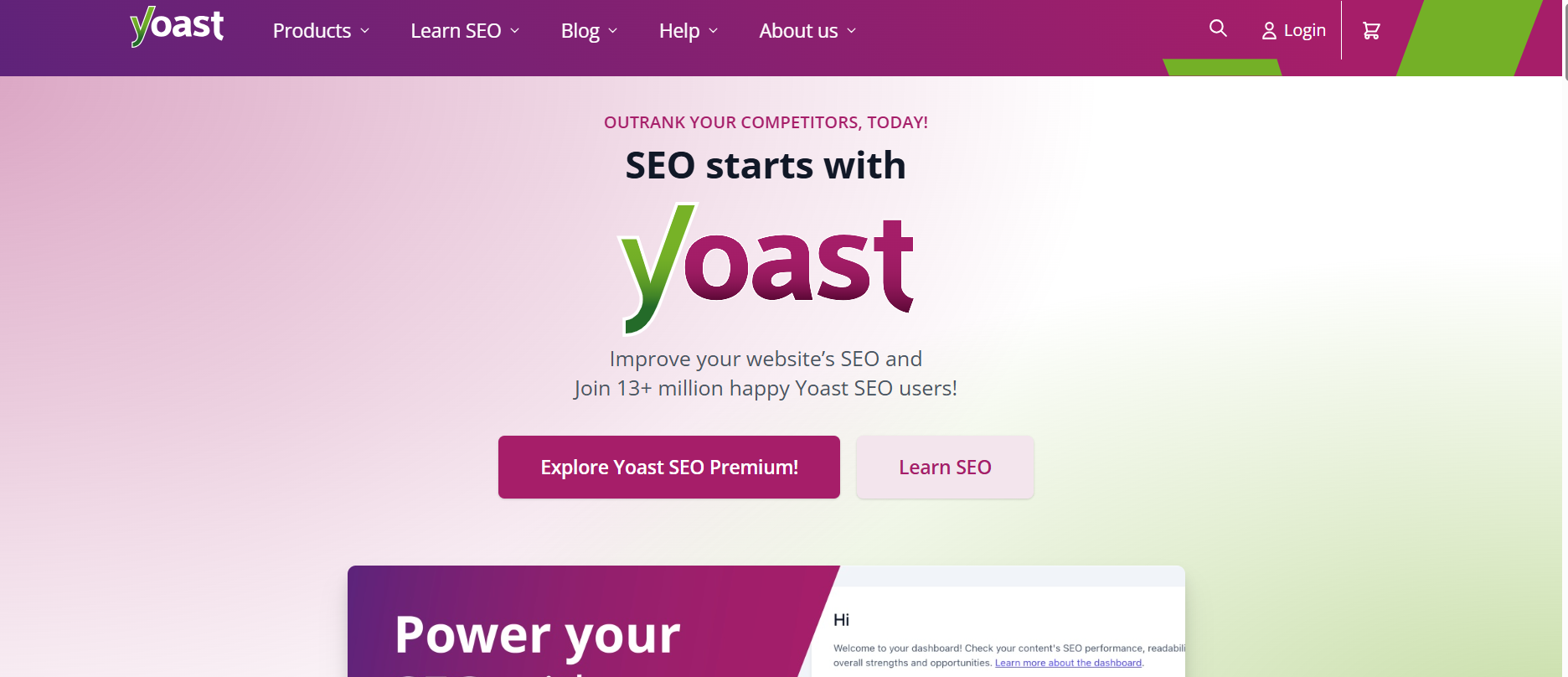
Yoast SEO’s Homepage -
Hotjar
Hotjar provides qualitative insights through heatmaps and session recordings, revealing how users actually experience your content.
We’ve found it especially useful to identify UX issues, such as confusing navigation, where readers lose interest, or which calls to action attract the most clicks.
These behavioral insights complement traditional analytics by showing the “why” behind the data, allowing me to optimize page layouts and content placement to boost engagement and conversions.
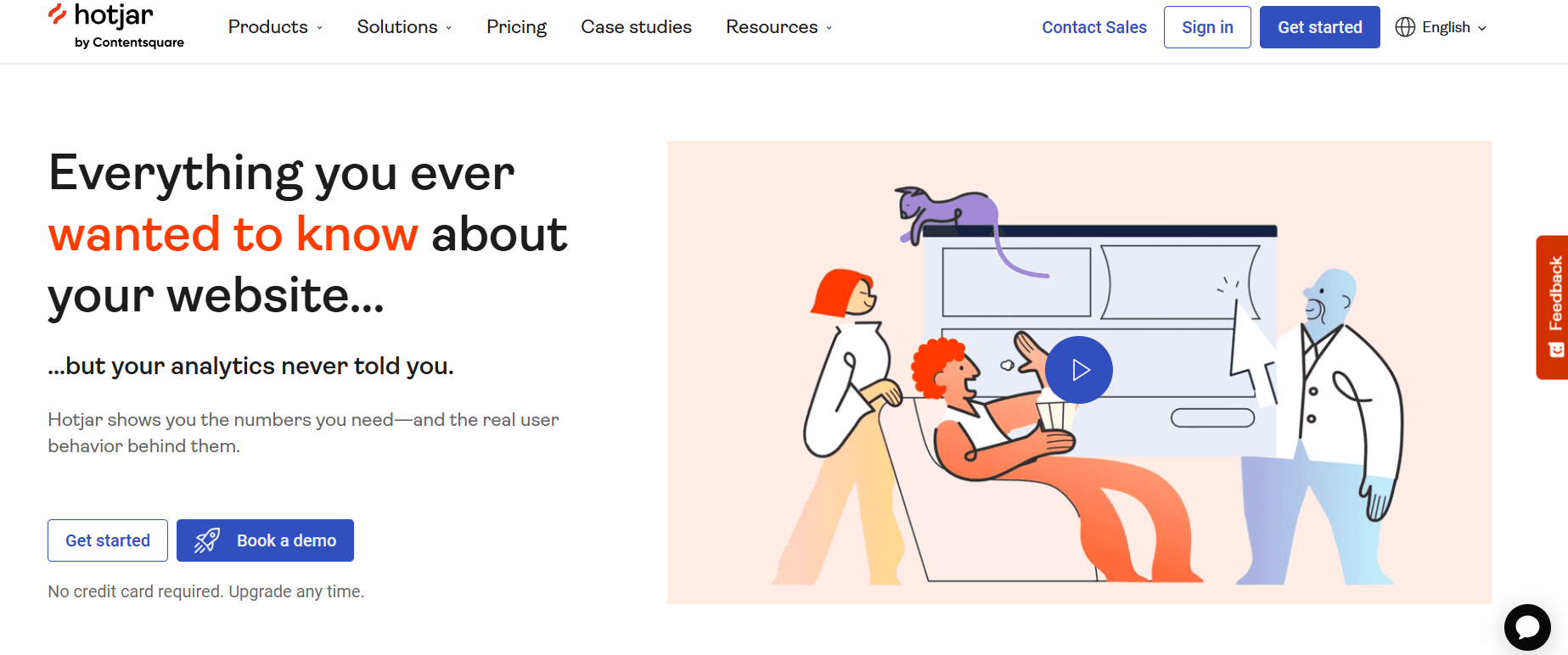
Hotjar’s Homepage -
Hemingway Editor
Hemingway Editor focuses solely on improving content readability by highlighting overly complex sentences, excessive adverbs, and passive voice.
It can be used as a final polish to ensure the writing is clear and accessible, which enhances the user experience and reduces bounce rates.
Although it doesn’t assist with SEO directly, its value lies in making your content more digestible, which is a critical factor in retaining readers and increasing engagement.
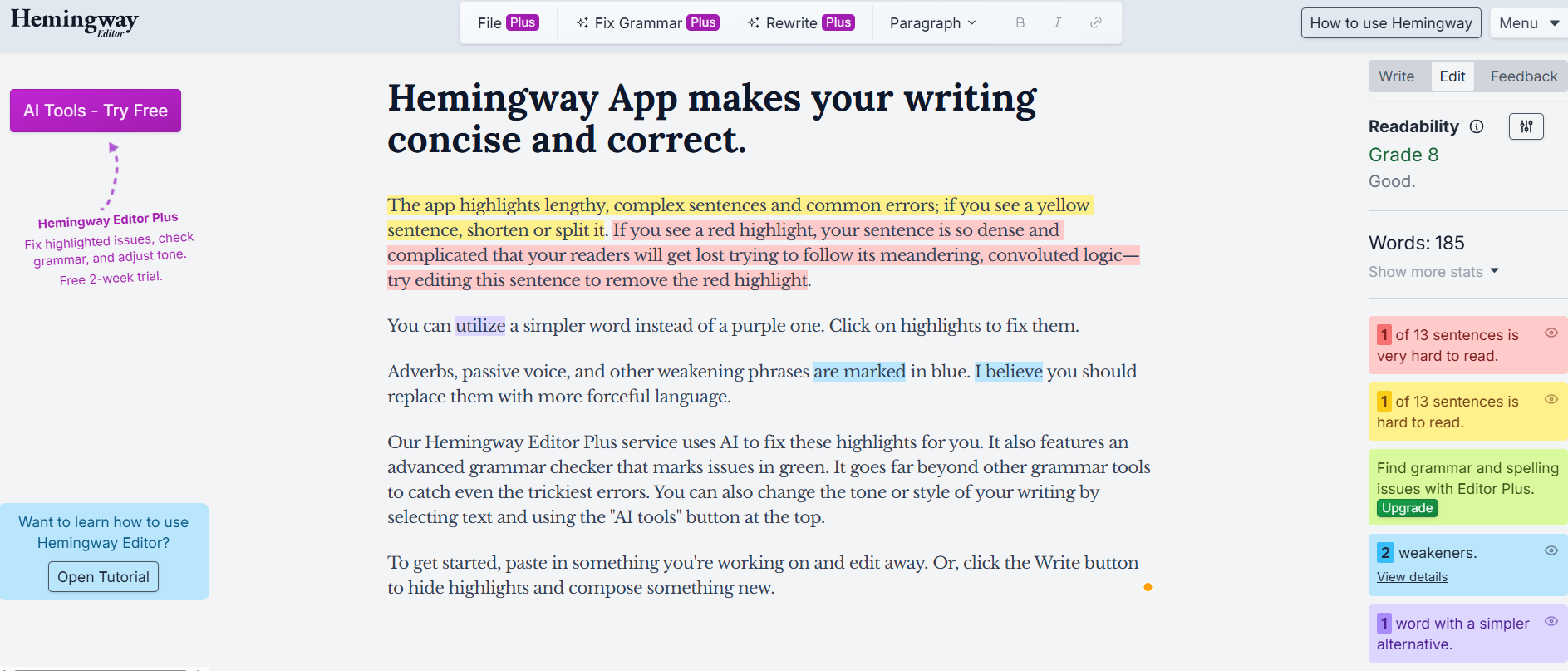
Hemingway Editor’s Dashboard
Featured Article: How to Market Your Business on Social Media: 15+ Proven Strategies for Explosive Growth
Conclusion
The best content marketing tools are essential for anyone serious about planning, creating, and scaling content effectively.
Today, relying on intuition alone is no longer enough.
Using a strategic combination of tools for keyword research, AI-assisted writing, visual design, content distribution, and performance analytics empowers marketers to make data-driven decisions and optimize every step of the content lifecycle.
These tools not only save time and boost productivity but also enhance content quality and audience engagement.
Whether you’re a solo blogger, a growing business, or a large marketing team, integrating the right tools into your workflow will position you for sustainable growth and measurable success.
Embracing the best content marketing tools ensures your content stands out, reaches the right people, and drives real business impact.
CTA
Social Media Chaos? Not With Social Champ.
Organize all your accounts, campaigns, and content in one place—no spreadsheets, no confusion.


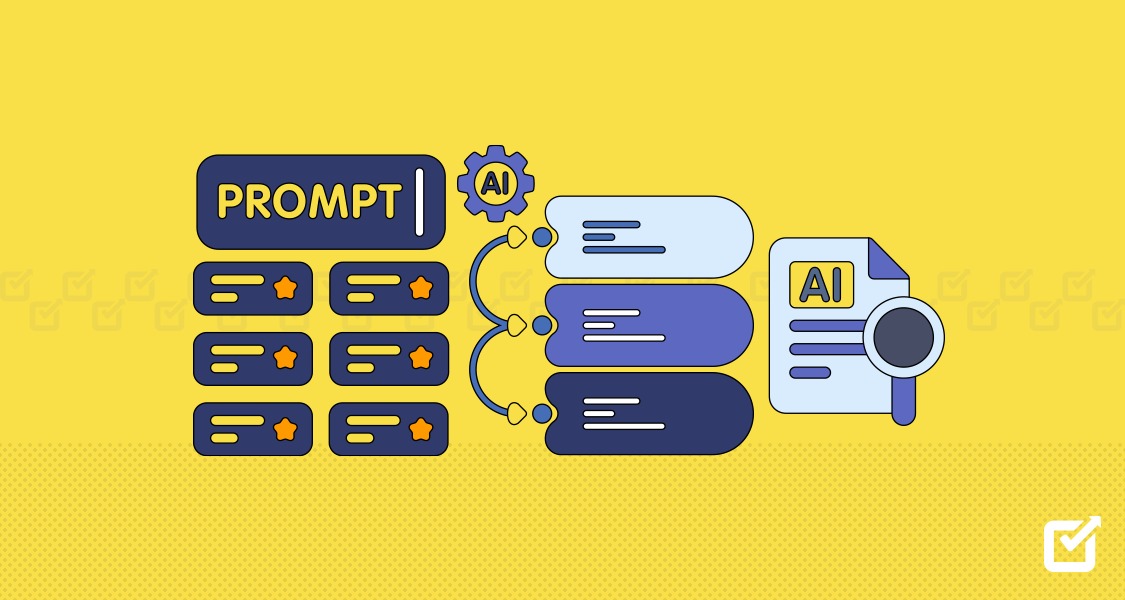

4 comments
Poulomi Basu
These are all amazing tools. Don’t know what I would do without Canva, Google Docs, Trello, and all my other tools 😉 As a small business, it can be tough to pay for everything though. Always have to prioritize.
Menry Thomson
Woww, these content marketing tools can be of great use i believe – thankyou for creating this useful guide.
Harold Steves
Amazing!This blog post is a valuable resource for anyone looking to streamline their content creation and promotion efforts.
Namia Ren
Very well-curated, surely gonna try these tools to boost my blog.